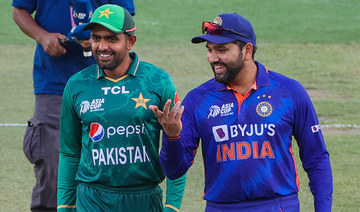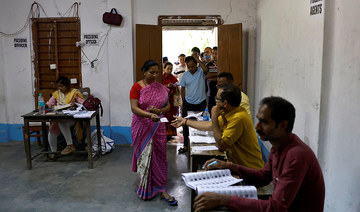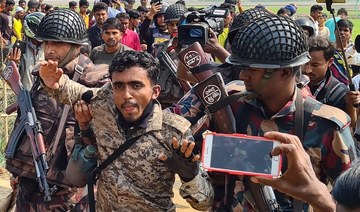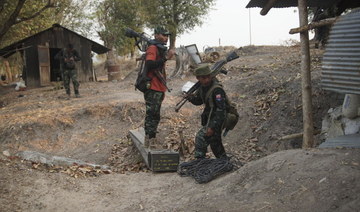STOCKHOLM: Immunity to COVID-19 in Sweden is likely lower than previously estimated, the country’s top epidemiologist and architect of its unorthodox pandemic strategy said on Thursday, as daily deaths in the disease rose to their highest level in months.
Chief Epidemiologist Anders Tegnell, whose rejection of lockdowns and widespread use of face masks made Sweden a European outlier, also acknowledged the country was battling a second wave of the pandemic after suggesting in August such a scenario was unlikely.
“I don’t think the definition is that important, but we see community spread in many regions simultaneously right now,” Tegnell told a news conference.
Sweden registered 4,658 new coronavirus cases on Thursday, just below a daily record set last week, Health Agency data showed, in a resurgence of the virus that has seen hospitalizations and intensive care admissions mount.
Tegnell played down hopes that Sweden’s severe spring outbreak of the virus might offer sizable protection through widespread immunity, saying the number of undetected infections had likely been lower than previously believed.
“The number of people we don’t find with diagnostics is with high probability smaller than we thought,” he said.
While Health Agency officials have stressed so-called herd immunity, where enough people in a population have developed immunity to an infection to effectively stop the disease from spreading, has never been a goal, it has been mentioned as a possible boon of Sweden’s strategy.
Sweden recorded 40 new deaths, taking the total to 6,122. While below peaks of more than 100 during the spring outbreak, it was far higher than during the late summer and early autumn when deaths slowed to single digits most days.
Relative to the size of its population, Sweden has suffered many times more COVID-19 deaths than its Nordic neighbors, though not quite as many as Europe’s worst-hit nations, such as Spain and Britain.
Sweden plays down immunity hopes as second COVID-19 wave gathers force
https://arab.news/bty3q
Sweden plays down immunity hopes as second COVID-19 wave gathers force
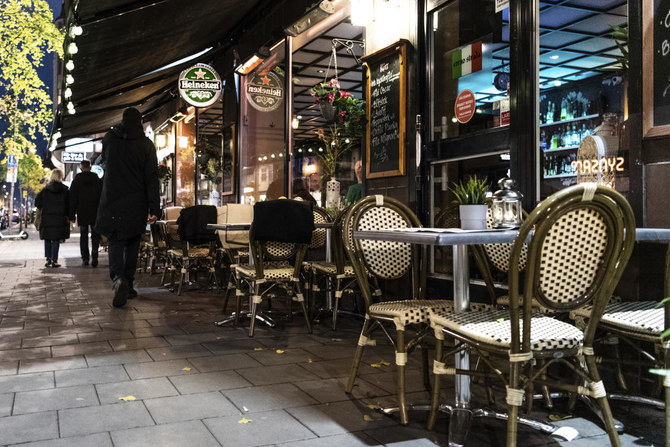
French police cordon off Iran consulate in Paris: security source

PARIS: French police cordoned off the Iranian consulate in Paris on Friday following reports that a man was threatening to blow himself up there.
A police source told Reuters the man was seen at about 11 a.m. (0900 GMT) entering the consulate, carrying what appeared to be a grenade and explosive vest.
Police said they were at the scene and asked the public to avoid the area but provided no further details.
Service was interrupted on a nearby metro line for security reasons, the RATP metro company said.
A person at the Iranian embassy who responded to a call from Reuters declined to provide any information on the situation.
It was unclear whether the incident had any link to the escalating tensions between Iran and Israel.
Earlier on Friday, explosions echoed over the Iranian city of Isfahan in what sources described as an Israeli attack, but Tehran played down the incident and indicated it had no plans for retaliation — a response that appeared gauged toward averting region-wide war.
Blinken says US ‘not involved in any offensive operation’

- ‘All I can say is for our part and for all the members of the G7 our focus is on de-escalation’
CAPRI, Italy: US Secretary of State Antony Blinken on Friday refused to comment on reports of an attack by Israel on Iran, beyond saying Washington was “not involved in any offensive operation.”
Speaking to journalists after a meeting with G7 counterparts in Italy, he declined to answer repeated questions about explosions in Iran, and reports that Israel had carried out retaliatory strikes.
“I’m not going to speak to these reported events... All I can say is for our part and for all the members of the G7 our focus is on de-escalation,” Blinken told a press conference on the island of Capri.
“The US has not been involved in any offensive operation,” he said.
Speaking to reporters earlier, G7 host Antonio Tajani, the foreign minister of Italy, said Washington had been informed in advance of the strikes, without giving details.
“The United States were informed at the last moment,” he said, adding that “it was just information” passed on — without saying who by.
The reports dominated the G7 Friday, with Tajani forced to change the agenda, but little public information emerged.
In its final statement, the Group of Seven ministers said: “In light of reports of strikes on April 19th, we urge all parties to work to prevent further escalation. The G7 will continue to work to this end.”
Israel had warned it would hit back after Iran fired hundreds of missiles and drones at Israel almost a week ago, in retaliation for a deadly strike — which Tehran blamed on its foe — that levelled Iran’s consular annex at its embassy in Syria.
Indians head to the polls in world’s biggest election
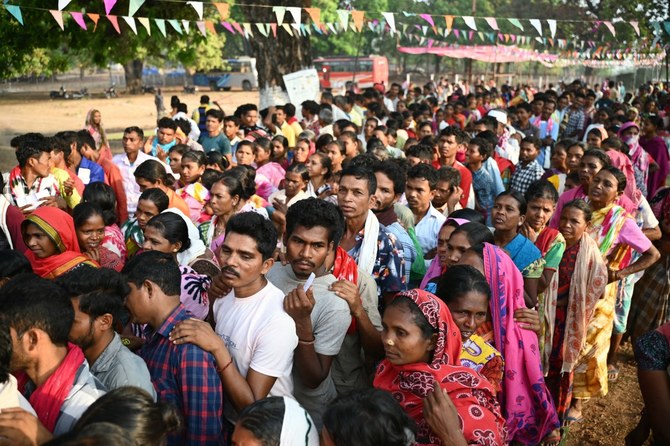
- Polling takes place in phases over the next six weeks, with results expected on June 4
- Over 968 million people are registered to vote, with 168.6 million casting ballots on Friday
NEW DELHI: Indian voters headed to the polls on Friday for the first phase of the world’s biggest general election, in which Prime Minister Narendra Modi is aiming for a rare third consecutive term.
More than 968 million people are registered to vote, with polling taking place over the next six weeks, as results are expected on June 4.
After April 19, the other voting dates will be April 26, May 7, May 13, May 20, May 25 and June 1, with some states completing the process on a single day, and others having it spread out in several phases.
Friday’s polling was held in 21 states and union territories, including the most populous ones such as Uttar Pradesh, Bihar, Rajasthan, Tamil Nadu, and Maharashtra, as well as smaller northeastern states and the northern Himalayan territory of Jammu and Kashmir.
In Kashmir, this is the first election since its special autonomous status and statehood were scrapped through the Indian government’s controversial constitutional amendment in 2019.
Chief Election Commissioner of India Rajiv Kumar told reporters on Friday that 168.6 million people were expected to cast their ballots on Friday.
“The preparations started, actually, two years back. Wide range of preparations … It’s a tremendous exercise,” he said.
MAIN CONTENDERS
More than 2,600 political parties are registered in the marathon election and 543 contested seats in the lower house of Parliament. The party or coalition that wins at least 272 is going to form the government.
Modi is targeting 400 seats for the National Democratic Alliance led by his Hindu nationalist Bharatiya Janata Party, which has been in power since 2014.
He is challenged by an alliance of two dozen opposition parties — the Indian National Developmental Inclusive Alliance, or INDIA, led by the Congress Party, which has ruled the country for close to 45 years since its independence in 1947.
The key leader of the opposition coalition is Rahul Gandhi — the son of Rajiv Gandhi, a grandson of Indira Gandhi, and a great-grandson of Jawaharlal Nehru, all of whom served as prime ministers of India.
While the opposition is trying to appeal to Indian youth with promises to tackle unemployment, free education and medical facilities, the BJP has deployed the same tactics as in previous polls — by mobilizing voters through majoritarian Hindu sentiment, despite constitutional provisions that make it a secular state.
Opinion polls show Modi as frontrunner, with 48 percent of respondents in the most recent survey released by the Centre for the Study of Developing Societies last week naming him as their choice for the prime minister. Gandhi was second, preferred by 27 percent.
“Modi has created an image of a powerful leader, a leader who is not only popular in India but outside too. He has also created an image of not pandering to Muslim communities in India … This image of a leader who does not appease the Muslim sentiments appeals to the Hindu masses. Politics of polarization helps Modi to build an image and aura among a large section of the Hindu voters,” Prof. Venkat Narayan, political analyst and commentator, told Arab News.
“Then the use of social media and the mainstream media is also there to create an image and broaden Modi’s appeal. The media plays a great role in creating this image, they are soft towards Modi and do not ask critical questions.”
If Modi wins the election, he will become the second prime minister, after Nehru, to succeed in three consecutive polls.
“Modi is leading in the polls as he has created an image of doing a lot for different sections of the society. Besides, he projects himself as squeaky clean. People also think that as he has no children, he has no reason to be corrupt or be on the take,” Sanjay Kapoor, analyst and editor of the English-language political magazine Hardnews, told Arab News.
“There are other reasons for his popularity, which include adroit use of media and social media that control all criticism against him. Then there are issues of raising India’s global profile and pursuing an independent foreign policy.”
FUTURE FOREIGN POLICY
Whoever wins the election, the foreign policy direction is likely to remain broadly unchanged, except for India’s orientation toward Israel and Palestine.
Support for Palestine and Palestinian statehood was once an integral part of India’s foreign policy, but in recent years, under Modi’s rule, New Delhi has become closer to Tel Aviv, despite civil society protests breaking out across the country against Israel’s deadly war on Gaza.
“If the INDIA alliance comes to power, then we may see a change in our policy towards Israel and Palestine. The INDIA alliance is sympathetic to Palestinians,” Kapoor said.
“We expect that the INDIA alliance will also restore ties with neighbors like Pakistan, (and) revive SAARC (South Asian Association for Regional Cooperation).”
The member states of SAARC — a regional intergovernmental organization and geopolitical union of states in South Asia — are Afghanistan, Bangladesh, Bhutan, India, Maldives, Nepal, Pakistan, and Sri Lanka.
The last biennial SAARC summit was hosted by Nepal in 2014. Pakistan was to host the summit in 2016, but it was stalled after India refused to participate, following an attack on an Indian army camp in Kashmir that New Delhi blamed on Pakistan-based militants.
VOTERS’ CONCERNS
According to the Centre for the Study of Developing Societies survey, unemployment emerged as the top concern for 27 percent of respondents.
Some 62 percent also said it has been more difficult to find a job in the last five years — during Modi’s second term in office.
“The biggest concern remains inflation and unemployment. The possibility of getting a job decreases if you study more. People are forced to leave India in search of jobs. Some have even gone as far as Russia and Israel,” Kapoor said. “The situation is really dismal.”
Rising prices and inflation were also a major issue — the top concern for 23 percent of the people surveyed by the CSDS.
“Women and the middle class are concerned about the rising prices. Modi is trying to divert attention from these main issues by talking about religion and temples,” said Shashi Shekhar Singh, associate professor at Satyawati College at the University of Delhi.
The CSDS pre-poll also revealed that despite the ruling party’s narrative promoting Hindu nationalist dominance to establish a majoritarian state in India, only 11 percent of respondents saw India as solely for Hindus.
But there were fears the reality on the ground could change if the BJP tried to amend India’s liberal and democratic constitution.
“Indian secularism and the very idea of a plural democracy is at stake,” Singh said.
“There is a fear that if the BJP comes to power with the thumping majority, the liberal and secular democracy will breathe its last. The BJP might lead the nation further down the path of a Hindu majoritarian state.”
ASEAN says ‘deeply concerned’ over escalating Myanmar violence
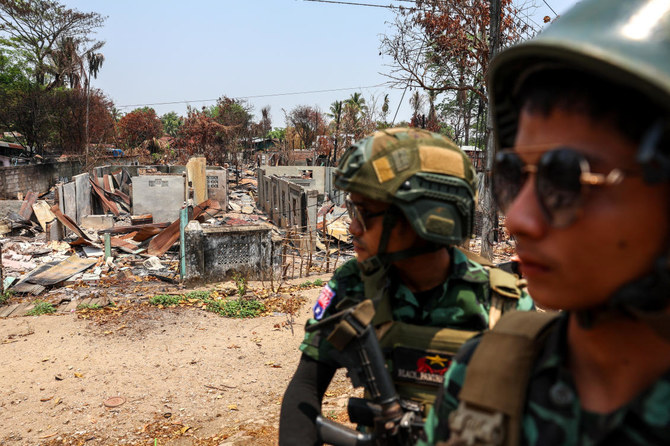
- ASEAN foreign ministers urge ‘all parties for an immediate cessation of violence’ in Myanmar
BANGKOK: Regional bloc ASEAN said it is “deeply concerned” about a recent upsurge in fighting in Myanmar, after fierce clashes over a key trading hub near the Thai border.
The foreign ministers of the Association of Southeast Asian Nations urged “all parties for an immediate cessation of violence” in Myanmar, which has been roiled by conflict since the military seized power in a February 2021 coup.
The ministers’ statement issued late Thursday said ASEAN was “deeply concerned over the recent escalation of conflicts, including in the area of Myawaddy.”
The military was last week forced to pull its troops out of positions in the valuable trading post after days of battling with the Karen National Union (KNU) — a long-established ethnic minority armed group — and other anti-junta fighters.
It was the latest blow suffered by the junta, which has suffered a string of battlefield losses in recent months, with some analysts warning it is its most significant threat to date.
Myawaddy is Myanmar’s main trade link to Thailand, and usually sees over a billion dollars worth of trade annually.
The clashes saw people flee across the border into Thailand — from where gunfire and the boom of artillery barrages could be heard.
Thailand has said it is ready to receive people from Myanmar, though the kingdom’s foreign minister warned it would not tolerate any violation of its sovereignty.
India starts voting in the world’s largest election as Modi seeks third term as PM
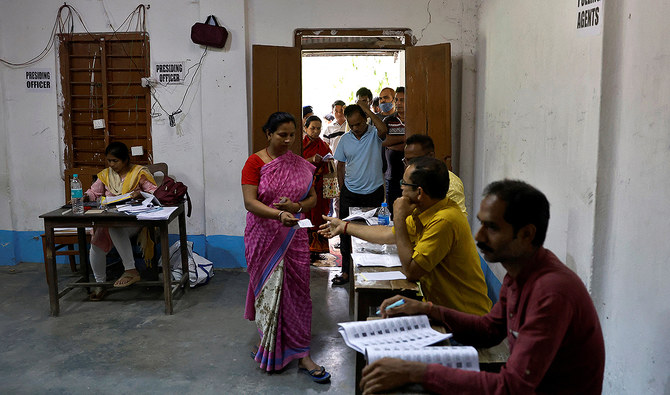
- Nearly 970 million voters will elect 543 members to lower house of Parliament
- The staggered elections will run until June 1, votes will be counted on June 4
NEW DELHI: Millions of Indians began voting Friday in a six-week election that’s a referendum on Narendra Modi, the populist prime minister who has championed an assertive brand of Hindu nationalist politics and is seeking a rare third term as the country’s leader.
The voters began queuing up at polling stations hours before they were allowed in at 7 a.m. in the first 21 states to hold votes, from the Himalayan mountains to the tropical Andaman Islands. Nearly 970 million voters — more than 10 percent of the world’s population — will elect 543 members to the lower house of Parliament for five years during the staggered elections that run until June 1. The votes will be counted on June 4.
One voter said she came early to avoid the summer heat later in the day.
Prime Minister Modi urged people to vote in record numbers. “I particularly call upon the young and first-time voters to vote in large numbers. After all, every vote counts and every voice matters!” he said in a message on the social media platform X.
This election is seen as one of the most consequential in India’s history and will test the limits of Modi’s political dominance.
If Modi wins, he’ll be only the second Indian leader to retain power for a third term, after Jawaharlal Nehru, the country’s first prime minister.
Most polls predict a win for Modi and his Hindu nationalist Bharatiya Janata Party, who are up against a broad opposition alliance led by the Indian National Congress and powerful regional parties.
It’s not clear who will lead India if the opposition alliance, called INDIA, wins the election. Its more than 20 parties have not put forward a candidate, saying they will choose one after the results are known.
The BJP is facing the toughest challenge in southern Tamil Nadu state with 39 seats where the voting is being held on Friday. The BJP drew a blank in 2019 and won one seat in the 2014 elections with the region dominated by two powerful regional groups, Dravida Munnetra Kazhagam and All India Anna Dravida Munnetra Kazhagam.
Modi focussed on the state this time and visited it more than a dozen times, holding several rallies and roadshows.
P. Chidambaram, an opposition Congress party leader and the country’s former finance minister, said after voting in Tamil Nadu state that people would not vote for the BJP in the state as “It is imposing one language, one culture, one system and one kind of food.”
The voting also is taking place in the northeastern state of Manipur that was ravaged by a near-civil war for a year caused by fighting between the majority Meitei and tribal Kuki-Zo people. Mobs have rampaged through villages and torched houses.
The election authority has set up voting stations for nearly 320 relief camps where more than 59,000 men, women and children are living. The state stands divided between a valley controlled by the Meiteis and the Kuki-dominated hills.
More than 150 people were killed and over 60,000 displaced. The voting for two seats will be completed on April 26.
In the 2019 elections, the BJP and its allies had won 39 of 102 seats where the voting is taking place on Friday. These include Rajasthan, Uttarakhand and West Bengal states.
The election comes after a decade of Modi’s leadership, during which the BJP has consolidated power through a combination of Hindu-first politics and economic development.
Modi has ratcheted up Hindu nationalist rhetoric on the campaign trail, and has sought to present himself as a global leader. His ministers tout him as the steward of a surging India, while his supporters celebrate his campaign promise to make India a developed nation by 2047, when it marks 100 years of independence.
But while India’s economy is among the world’s fastest-growing, many of its people face growing economic distress. The opposition alliance is hoping to tap into this, seeking to galvanize voters on issues like high unemployment, inflation, corruption and low agricultural prices that have driven two years of farmers’ protests.
Critics warn that Modi has turned increasingly illiberal and that he could use a third term to undermine India’s democracy. His Hindu nationalist politics, they argue, has bred intolerance and threatens the country’s secular roots.
The alliance has promised to arrest the democratic slide it says India has witnessed under Modi’s rule. They accuse Modi of sidelining elected ministers in favor of trusted bureaucrats and using tax authorities and the police to harass critics and opposition parties.
“Modi has a very authoritarian mindset. He doesn’t believe in democracy. He doesn’t believe in Parliamentarianism,” said Christophe Jaffrelot, who has written about Modi and the Hindu right.
Modi insists that India’s commitment to democracy is unchanged. He told a Summit for Democracy meeting in New Delhi in March that ‘“India is not only fulfilling the aspirations of its 1.4 billion people, but is also providing hope to the world that democracy delivers and empowers.’’
The Indian leader enjoys vast popularity among India’s 1.4 billion people. His BJP dominates in Hindi-speaking northern and central parts of India, and is now trying to gain a foothold in the east and south to capture a two-thirds majority. Modi and other BJP candidates have repeatedly vowed to take at least 400 seats.
The party hopes for a landslide win powered by its popular welfare programs, which it says have improved access to clean toilets, health care and cooking gas, as well as providing free grain to the poor. Moves like the construction of a controversial temple to Ram on the site of a demolished mosque, and the scrapping of the disputed Muslim-majority region of Kashmir’s former autonomy, may resonate with supporters who hail him as the champion of the Hindu majority.
“Any party that comes back for a third term, and with a brute majority, is a scary prospect for democracy,” said Arati Jerath, a political commentator.
Modi’s two terms have seen civil liberties in India come under attack and it implementing what critics say are discriminatory policies. Peaceful protests have been crushed with force. A once free and diverse press is threatened, violence is on the rise against the Muslim minority, and government agencies have arrested opposition politicians in alleged corruption cases.
The BJP has denied its policies are discriminatory and says its work benefits all Indians.








